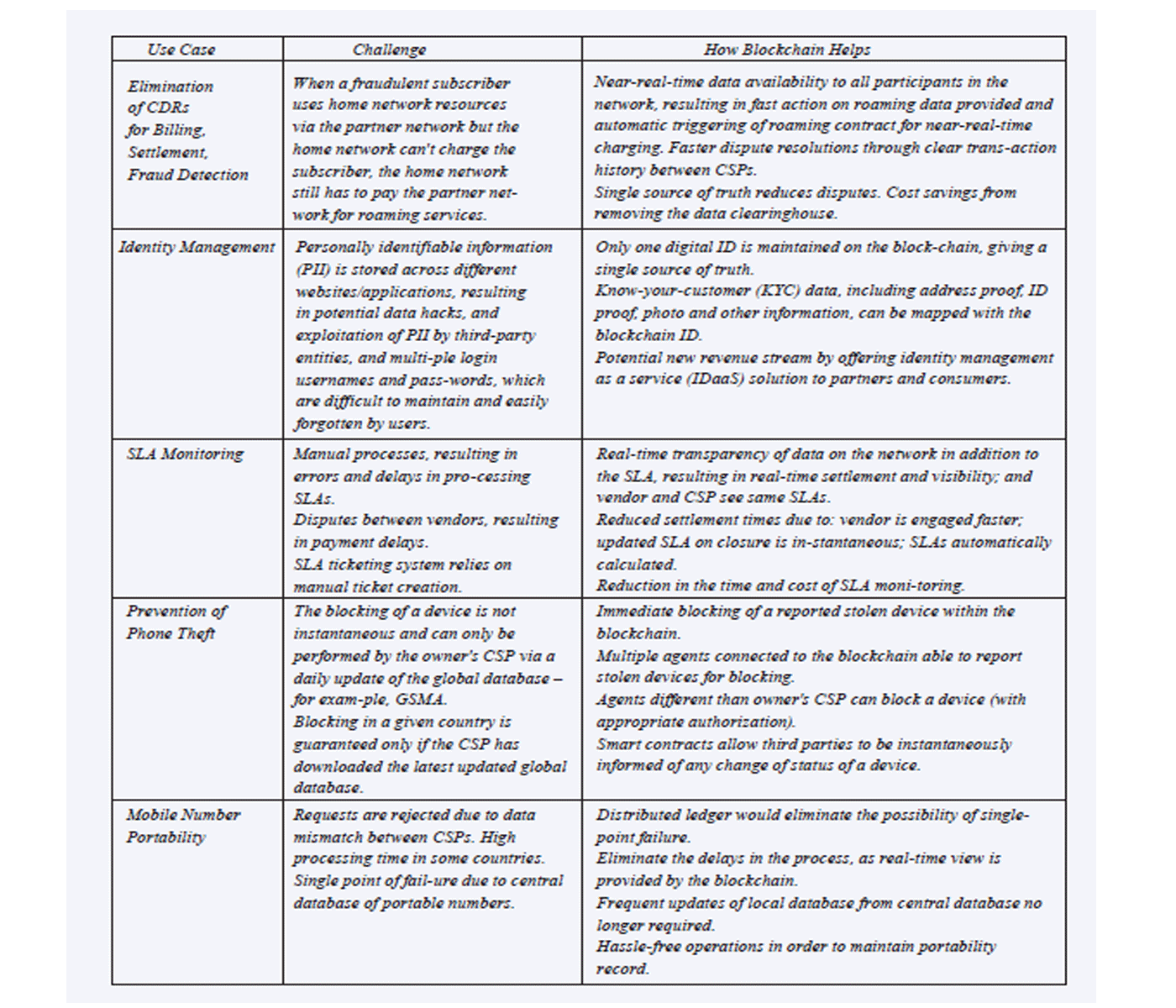
Blockchain Finding Feet In Telcos


Apoorv Srivastava, Director, Technical & Service Design at BT Global Services
INTRODUCTION
In essence, blockchain is a decentralized, immutable electronic ledger; a write once read many record of historical transactions, as opposed to a database that can be written over. Individual transactions are blocks in the chain. A mathematical procedure is used to verify that a block is truly part of the legitimate chain. Parties to a transaction put their trust in math, instead of a traditional intermediary such as a government entity, broker or lawyer. Trying to fake a block in the chain is difficult, as the ledger is replicated and widely dispersed; one would need to hack into all the copies of the ledger and change each one individually in order to fool the collective system. If the cost of doing this out-weighs the economic benefit, then the blockchain is safe
Starting with the conceptualisation of Bitcoin in 2008, both platforms and their applications are evolving rapidly. Following the launch of the Ethereum platform in mid-2015, “smart contracts” that are secured in a set of blockchain transactions have been proposed for just about anything of value.
A consequence of the steep innovation curve for blockchain technologies has been both an appropriation for very different purposes and an over hyping of potential implications. “Satoshi Nakamoto’s” seminal White Paper was written in the depth of disillusionment with banks and financial institutions following the 2007 crash; Bitcoin was founded as a peer-to-peer cryptocurrency that would make banks or any other intermediary organisation unnecessary. Not surprisingly, the large investments made by the financial services sector into further research and development have not been in support of Satoshi’s millennial vision. Rather the opposite; new generations of cryptocurrencies and other forms of value transactions are designed to be “permissioned”(closed) and in some cases editable.
WHAT IT MEANS FOR TELCO-Unleashed Used Cases
There have been various used cases which are now either on conceptualization stage or proto typing but unfortunately all of them are looking out opportunities with a lens of utilizing crypto modelling I called while
Smart contracts have already set the stage for utilizing blockchain for enterprise level deployment. If we look out with unleashed used cases in CSP environment there are many possibility around us such as listed in this article as examples.
CHALLENGES
•Since a blockchain retains all historical data, the size of an established blockchain at each node might become unsustainable. Instead, a mechanism to archive historical data needs to be looked at. Several alternatives are currently being explored in this regard by various players in the blockchain ecosystem.
•Clear regulatory frameworks(TRAI) need to be defined for the implementation of agreements as digital, smart contracts
•Conforming to existing data standards in terms of both structure and transport for sharing of information could prove to be an initial hurdle.
Summary
In conclusion, the benefits of adopting a blockchain in the core and auxiliary operations of a Communications Service Provider are plenty, as highlighted above. CSPs should take a long term view of blockchains and their potential to add value to the enterprise in both their current and new business models. There will be challenges to adoption of the blockchain, as with any new technology that holds the promise of significant disruption. However, CSPs would do well to work together to enable the full realization of the benefits Major worldwide service providers are increasingly investing in blockchain development and implementation by entering into partnerships or collaboration agreements with technology companies and investing in funds dedicated to blockchain technology research and development. Providers, both incumbent and startups, who take advantage of this new technology and innovate themselves are going to reap the benefits on the outset, while the slackers will lose to their competition and their business will be disrupted. Get on the train or you will be left on the track!
potential to add value to the enterprise in both their current and new business models. There will be challenges to adoption of the blockchain, as with any new technology that holds the promise of significant disruption. However, CSPs would do well to work together to enable the full realization of the benefits Major worldwide service providers are increasingly investing in blockchain development and implementation by entering into partnerships or collaboration agreements with technology companies and investing in funds dedicated to blockchain technology research and development. Providers, both incumbent and startups, who take advantage of this new technology and innovate themselves are going to reap the benefits on the outset, while the slackers will lose to their competition and their business will be disrupted. Get on the train or you will be left on the track!
So, which use cases is your telco organization looking to reinvent with Blockchain?.
CHALLENGES
•Since a blockchain retains all historical data, the size of an established blockchain at each node might become unsustainable. Instead, a mechanism to archive historical data needs to be looked at. Several alternatives are currently being explored in this regard by various players in the blockchain ecosystem.
•Clear regulatory frameworks(TRAI) need to be defined for the implementation of agreements as digital, smart contracts
•Conforming to existing data standards in terms of both structure and transport for sharing of information could prove to be an initial hurdle.
Summary
In conclusion, the benefits of adopting a blockchain in the core and auxiliary operations of a Communications Service Provider are plenty, as highlighted above. CSPs should take a long term view of blockchains and their
 potential to add value to the enterprise in both their current and new business models. There will be challenges to adoption of the blockchain, as with any new technology that holds the promise of significant disruption. However, CSPs would do well to work together to enable the full realization of the benefits Major worldwide service providers are increasingly investing in blockchain development and implementation by entering into partnerships or collaboration agreements with technology companies and investing in funds dedicated to blockchain technology research and development. Providers, both incumbent and startups, who take advantage of this new technology and innovate themselves are going to reap the benefits on the outset, while the slackers will lose to their competition and their business will be disrupted. Get on the train or you will be left on the track!
potential to add value to the enterprise in both their current and new business models. There will be challenges to adoption of the blockchain, as with any new technology that holds the promise of significant disruption. However, CSPs would do well to work together to enable the full realization of the benefits Major worldwide service providers are increasingly investing in blockchain development and implementation by entering into partnerships or collaboration agreements with technology companies and investing in funds dedicated to blockchain technology research and development. Providers, both incumbent and startups, who take advantage of this new technology and innovate themselves are going to reap the benefits on the outset, while the slackers will lose to their competition and their business will be disrupted. Get on the train or you will be left on the track!So, which use cases is your telco organization looking to reinvent with Blockchain?.